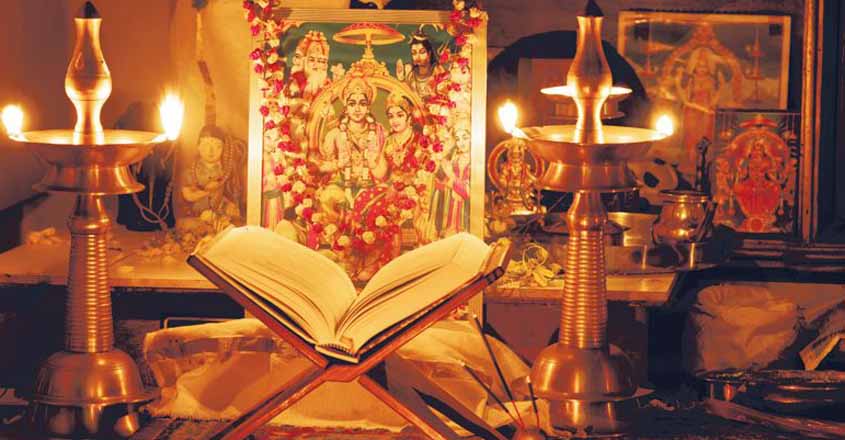RAMA - THE APOTHEOSIS OF HUMAN PERFECTION -4. Swami Krishnananda
======================================================================
=======================================================================
Tuesday, August 16, 2022. 09:00.
Post-4.
=====================================================================
It was not at all given to Rama to proclaim Himself as Narayana. That was not the purpose of the Avatara at all. It was to defeat the purpose of Ravana, who had a poor opinion of human beings.
Being a demon, he thought that human beings and monkeys were only a morsel of food for him. On
account of this, he deliberately omitted men and monkeys from the list of his possible future enemies
when he asked for boons from Brahma. “May I not have death from anyone—Gods, Kinnaras,
Kimpurushas, Daityas, Danavas, all superhuman beings,” was the boon he asked. But he never said
anything about monkeys and men. He thought: “They are only food for me; what need to fear them.”
Now, this neglect, this contemptuous attitude of Ravana towards aspects through which God could
manifest Himself and does manifest Himself, was the occasion for God Himself to teach humanity
that He can work miracles even through the lowest of His manifestations. And the other side of the
teaching of the epic is that through humanity we reach Divinity.
------------------------------------------------------------------------------------------------------------------------
Sometimes, we are told that the ten Avataras— incarnations of Vishnu beginning from the incarnation
as Fish, the Matsya Avatara; the incarnation as Tortoise, the Kurma Avatara; the incarnation as Boar,
the Varaha Avatara; and so on—represent the process of the evolution of the human consciousness to
the perfection of its Realisation.
From this point of view of understanding of human nature and its evolution, the stage which was
enacted by Rama, God in human form, was the penultimate step which Consciousness takes in its
attempt at Self-realisation. He showed what human perfection is and how it becomes a stepping-stone
to divine perfection.
----------------------------------------------------------------------------------------------------------------------
This we can know only when we read the whole of the Ramayana from the beginning to the
end, reading also between the lines. Most of us do not know what the whole Ramayana is. We know
only some outline—that Rama was a son of Dasaratha, he learnt archery from Visvamitra, married Sita,
who was stolen by Ravana, and then he befriended Sugriva and Hanuman, crossed the ocean, went
to Lanka and then killed Ravana. This is all the Ramayana we know. Everyone knows only this
much of it. But this is not the whole of Ramayana, whether it is the Ramayana of Tulasidas, Valmiki
or anyone else. The real Ramayana is the spirit that is manifest in its words when we read the original
of the Masters. Whether it is Kamban’s Ramayana or Tulasidas’s Ramayana or Valmiki’s Ramayana,
ultimately it makes no difference because it is said that all great men think alike. All these masters
thought alike and they had a common purpose. One wrote in Tamil, another wrote in Hindi and the third
wrote in Sanskrit, but the spirit expressed by these is similar and common, and it is directed
to the same purpose of transforming human nature into divine perfection.
-------------------------------------------------------------------------------------------------------------------------
I will now give an outline of the background of the writing of the Ramayana and the purpose behind
the epics of India. The other more important aspect relevant to a sadhaka or seeker of Truth is that
Sri Ramanavami, the birthday of Sri Ramachandra, is a day for divine contemplation. It is an occasion
for intensified contemplation on the Spirit, God, or Sri Rama, as we call Him. It is a day of self-control
and an occasion to raise our emotions, feelings and understanding to the level of the understanding of
Valmiki or Tulasidas or Kamban, or of Sri Rama Himself. These contemplations are processes by
which Consciousness, our own Self, establishes relationship with the powers of the cosmos. The
observation of the birthday of Sri Rama, or the celebration of Sri Ramanavami, is not a day of
mere rejoicing or feasting, but a day of spiritual contemplation and self-restraint, by which we
become en rapport with the forces of the world. What was the power of Rama? Why was He so
powerful and forceful? We say that He was an incarnation of God. But, why is God so powerful,
while we are not? What is the difference? What makes these masters, heroes and incarnations
centres of such energy, force and activity, while we are the contrary of it? The simple reason is that
they are en rapport with the forces of the universe, while we are cut off from them. They are facing the
light of the sun and so they drink the nectar of the rays of the sun. But we turn our backs to the sun and
see only darkness. This is the difference between mortal men and divine incarnations who are
immortal, eternal emblems moving on this earth. So, in these contemplations today, as on similar such
occasions, we should recharge the cells of our personality by introducing a new light of divinity into
ourselves. Let not the day pass in waste, in idle talk or merely hearing a few words about the Ramayana
from someone. These celebrations are only indications for you, pointers to you, to help you to raise
yourself up to a state higher than you were yesterday. If your days have not been spent without getting
at least an iota of satisfaction or contentment that you have become a worthy child of God, in His eyes,
you should consider your life as unworthily spent.
To be continued ....
=======================================================================





.jpg)
Comments
Post a Comment